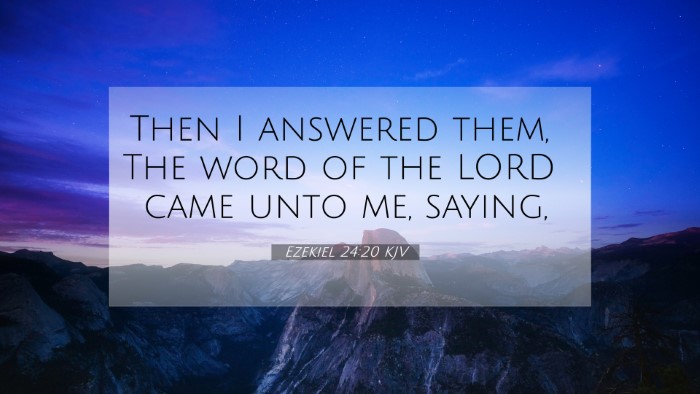Ezekiel 24:20 - Understanding the Verse
Ezekiel 24:20 states:
"And I answered them, The word of the Lord came unto me, saying,"
This portion of Scripture focuses on Ezekiel’s role as a prophet, conveying God's messages to the people of Israel during a time of turmoil and judgment. The verse encapsulates both the divine communication and the response of the prophet, emphasizing the relationship between God and His messenger.
Meaning and Insights from Public Domain Commentaries
In understanding Ezekiel 24:20, we can draw from insights provided by several esteemed biblical commentators:
-
Matthew Henry:
Henry discusses the significance of God speaking through Ezekiel during a period of severe judgment. He highlights how such divine communication indicates God’s ongoing relationship with His people, even amidst their distress. Ezekiel’s obedient response signifies the importance of listening to and proclaiming God's word.
-
Albert Barnes:
Barnes comments on the urgency of God's message given the impending siege of Jerusalem. He suggests that this verse serves as a reminder of the power of prophetic utterance, wherein the prophet is a vessel through which God speaks, thus establishing a direct connection between divine sovereignty and human affairs.
-
Adam Clarke:
Clarke emphasizes the context of grief and loss that surrounds the prophet. He interprets this communication as God's intention to remind the people that even in hopelessness, His word remains a source of guidance and correction. Clarke indicates the broader implications for understanding God's justice and mercy.
Theological Implications
The implications of Ezekiel 24:20 can be expansive, demonstrating God's unceasing desire to communicate with His people. The act of the prophet hearing and relaying God’s message reflects the ongoing dynamic of thematic Bible verse connections throughout both the Old and New Testaments.
Cross-References Related to Ezekiel 24:20
Several Bible verses resonate with the themes expressed in Ezekiel 24:20, enabling comparative Bible verse analysis:
- Amos 3:7: "Surely the Lord God will do nothing, but he revealeth his secret unto his servants the prophets." This emphasizes God's method of communication through prophets.
- Jeremiah 1:7: "But the Lord said unto me, Say not, I am a child: for thou shalt go to all that I shall send thee, and whatsoever I command thee thou shalt speak." This illustrates the call and empowerment of the prophet.
- Ezekiel 2:4-5: "For they are impudent children and stiffhearted. I do send thee unto them; and thou shalt say unto them, Thus saith the Lord God." This provides context for Ezekiel's mission.
- Hebrews 1:1: "God, who at sundry times and in divers manners spake in time past unto the fathers by the prophets..." This passage connects the Old Testament method of divine messaging with the New Testament's fulfillment.
- Isaiah 6:8: "Also I heard the voice of the Lord, saying, Whom shall I send, and who will go for us? Then said I, Here am I; send me." This verse emphasizes the readiness to serve and hear God's call.
- Revelation 1:3: "Blessed is he that readeth, and they that hear the words of this prophecy, and keep those things which are written therein: for the time is at hand." This highlights the importance of receiving and acting on God's message.
- Romans 10:15: "And how shall they preach, except they be sent? As it is written, How beautiful are the feet of them that preach the gospel of peace, and bring glad tidings of good things!" This connects the roles of prophets and evangelists.
Tools for Bible Cross-Referencing
Effective understanding of Scriptures such as Ezekiel 24:20 benefits from using various tools for Bible cross-referencing. This can aid in the exploration of thematic connections and similarities among Biblical texts:
- Bible Concordances: Useful for finding terms and themes across different verses.
- Bible Cross-Reference Guides: Provide structured perspectives on related verses.
- Cross-Reference Bible Study: Helps create a richer understanding of Biblical narratives through interconnection.
How to Use Bible Cross-References
To enhance Biblical study:
- Identify key themes or words in the verse.
- Consult a comprehensive Bible cross-reference system.
- Engage with texts that support or expand upon the original Scripture.
Conclusion
Ezekiel 24:20 serves as a profound example of the communication between God and humanity through prophetic voices, emphasizing the importance of listening to divine instructions. By interlinking Scripture through cross-referencing, one can foster a deeper understanding of Biblical messages and their relevance throughout the ages.


